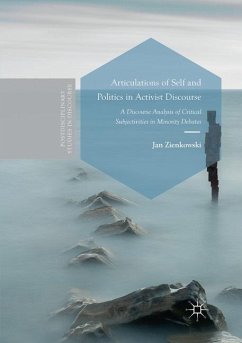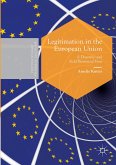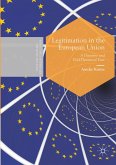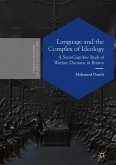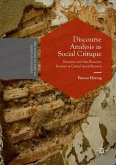This book focuses on the discursive processes that allow activists to make sense of themselves and of the modes of politics they engage in. It shows how political and metadiscursive awareness develop in tandem with a reconfiguration of one's sense of self. The author offers an integrated pragmatic and poststructuralist perspective on self and subjectivity. He draws on Essex style discourse theory, early pragmatist philosophy, and linguistic pragmatics, arguing for a notion of discourse as a multi-dimensional practice of articulation. Demonstrating the analytical power of this perspective, he puts his approach to work in an analysis of activist discourse on integration and minority issues in Flanders, Belgium. Subjects articulate a whole range of norms, values, identities and narratives to each other when they engage in political discourse. This book offers a way to analyse the logics that structure political awareness and the associated boundaries for discursive self-interpretation.
"This is an important and ambitious work: ... it encompasses a wide theoretical and empirical spectrum. As somebody with a predominant research interest in geographic issues, I benefited most from Zienkowski's theoretical explorations. ... the reader is free to concentrate either on the conceptual or the empirical part of this highly recommended book." (Markus Leibenath, Communications, Vol. 44 (1), 2019)
"Without doubt this is an important and ambitious work: Large in scale, it encompasses a wide theoretical and empirical spectrum. ... he has managed to bridge the often separate spheres of discourse theory and governmentality research, on the one hand, and linguistic pragmatics, on the other, much more successfully than any previous attempt. I also found the empirical discussion highly stimulating. Zienkowski certainly provides valuable insights into the ambivalent and conflict-ridden subjectivation processes of intellectual-activists with a Moroccan background inFlanders." (Markus Leibenath, Communications, October 17, 2018)
"This volume is an investigation of the logics and abstract categories that motivate the interplay between integration, racism, migration, and discrimination in the political engagements of Flemish, Belgian, and/or Moroccan activists and intellectuals in Flanders. ... This volume highlights the possibility of further nuancing discourse studies when approached from an interdisciplinary orientation." (Christian Go, Language in Society, Vol. 47 (04), June, 2018)
"Without doubt this is an important and ambitious work: Large in scale, it encompasses a wide theoretical and empirical spectrum. ... he has managed to bridge the often separate spheres of discourse theory and governmentality research, on the one hand, and linguistic pragmatics, on the other, much more successfully than any previous attempt. I also found the empirical discussion highly stimulating. Zienkowski certainly provides valuable insights into the ambivalent and conflict-ridden subjectivation processes of intellectual-activists with a Moroccan background inFlanders." (Markus Leibenath, Communications, October 17, 2018)
"This volume is an investigation of the logics and abstract categories that motivate the interplay between integration, racism, migration, and discrimination in the political engagements of Flemish, Belgian, and/or Moroccan activists and intellectuals in Flanders. ... This volume highlights the possibility of further nuancing discourse studies when approached from an interdisciplinary orientation." (Christian Go, Language in Society, Vol. 47 (04), June, 2018)

